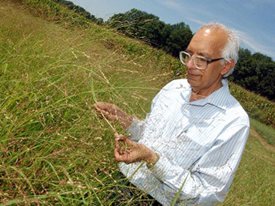A recent NPR story by Dan Charles featured the perennial grain called Kernza. Headlined “Can This Breakfast Cereal Save the Planet?” the story looked at Kernza’s benefits to the soil, which include preventing erosion and sequestering carbon; the scientists at the Salina, Kansas-based Land Institute who developed and are continuing to work with Kernza; and efforts by General Mills, the maker of Wheaties and Cheerios, to turn the new grain into cereal.
Kernza-wise, CFAES scientist Steve Culman and his colleagues are studying the grain as well, including as part of a multistate study. Read more on their work here and here.

 Look for new players like riprap, blazing star and willow fascines in Ohio State’s
Look for new players like riprap, blazing star and willow fascines in Ohio State’s  The Ohio State Soil Judging Team is heading to the National Collegiate Soil Judging Contest next April that will be hosted by Kansas State University in Manhattan, Kansas.
The Ohio State Soil Judging Team is heading to the National Collegiate Soil Judging Contest next April that will be hosted by Kansas State University in Manhattan, Kansas.
 The
The